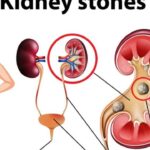Prostate cancer is a deadly cancer that kills many men every year. In this article, we will explain more on this topic: how does prostate cancer kill you in the end? In addition, we will discuss different states of the disease.
What is prostate cancer?
The prostate is a small gland below the bladder; its main function is to produce semen. When cancer develops in the prostate, it can cause symptoms such as frequent urination, difficulty urinating, and pain in the pelvic area. African American men and those with a family history of the disease are at a higher risk.
Stages of Prostate Cancer
There are four main stages of prostate cancer. They are:
- Stage I: The cancer is within the prostate gland
- Stage II: Cancer may have increased in size; however, they have not advanced to other areas of the body, like nearby lymph nodes or bone.
- Stage III: Cancer extends beyond the location of the prostate to other body tissues.
- Stage IV: Cancer has spread to other parts of the body, example: the bones or lungs. (Metastatic prostate cancer).
How prostate cancer spreads in the body
Prostate cancer can spread throughout the body in the following ways:
1. Lymphatic system
Prostate cancer can also spread through the formation and spread of metastatic tumors in the lymphatic system. Lymph nodes are round, hard structures about the size and shape of a kidney bean. They help filter lymph fluid and trap cancer cells.
While cancer tissue itself remains in the prostate gland, cancer cells can detach from the original tumor and enter the nodes and tissues of the lymphatic system in the body.
2. Bloodstream
Another way prostate cancer can spread is through the bloodstream. Cancer cells spread through the blood in both veins and arteries and move to other areas in the body such as the bones, liver, or lungs, respectively. When such cells get to a new organ, they are capable of forming new tumors and growth takes place.
What Happens in the Final Stages of Prostate Cancer?
At the end of the life stage of the patient with prostate cancer, the person might experience several signs like:
1. Metastasis
the disease has extended to the other tissues of the body, a process called metastasis, and this normally happens at the final stages of prostate cancer. It can cause the cancer to spread to organs like the bones, liver, or lungs.
2. Severe Pain
Bone pain is one of the main presenting symptoms of metastatic cancer in the prostate gland. This discomfort may be severe and challenging to treat, and many patients may need to use powerful analgesics. 3.
3. Urinary and Bowel Issues
It also has consequences on the urinary and bowel functions as the cancer advances to other stages. Some of the signs of prostate cancer include passing small amounts of urine, often getting blood in the urine, or having trouble urinating. Loose stools or even constipation may also be part of the symptoms complained of by patients.
4. Fatigue
It is also common to feel tired when you are in the last stages of prostate cancer. In addition,it can also be difficult for a patient to perform daily tasks and will lead to fatigue, both physically and emotionally.
5. Weight Loss
Often, as the cancer develops, the patient starts to lose weight. This may be due to the body’s need for more energy, loss of appetite, or cancer making it impossible for the body to absorb nutrients.
6. Psychological Distress
The physical manifestation of the end complications of prostate cancer can also have psychological effects on a patient. They may suffer from stressful, depressive, or even pessimistic states based on hearsay of their illness.
How Does Prostate Cancer Kill You In The End?
1. Metastasis
Just as is the case with other cancers, the moment the cancer cells escape from the prostate, they are capable of finding new host sites and start developing tumors that compromise the functionalities of these organs. This process, called metastasis, can result in organ failure or death.
2. Hormonal imbalances
This is because the majority of prostate cancer cells depend on agents, namely hormones, especially testosterone, to enhance their growth and reproduction.
Some therapies for prostate cancer are to reduce the amount of hormones, and this will lead to side effects like tiredness, a decrease in muscle mass, and irritability. Sometimes hormonal therapy may not work, and this enables cancer cells to spread further and can affect other organs.
3. Compression of vital structures
Prostate cancer, especially in its advanced stages, causes the formation of large tumors that exert pressure on certain organs, for example, the urethra, bladder, or even spinal cord. This compression may cause such problems as urinary retention, renal failure, paralysis, etc., which in turn can be fatal if appropriate measures are not taken.
4. Blood vessel invasion
Like many other types of cancer, prostate cancer is put into the category of malignant because the cells can infiltrate the veins and take routes through the bloodstream to other sites within the body.
This dissemination process is realized through the bloodstream and gives rise to clot formation, obstruction, or hemorrhage in various organs, which in turn is accompanied by organ dysfunction and failure.
Treatment complications
In some cases, cancer treatments like surgery, radiation therapy, and chemo may be useful in treating prostate cancer, yet come with severe side effects that may affect a patient’s health in general.
Read also: Can Prostate Cancer Spread?
Factors that determines Prostate Cancer Survival Rates
1. Stage of the cancer
Prostate cancer is normally classified in terms of the tumor size and whether it has had the chance to metastasize to other parts of the body. The time of detection of cancer and treatment begins also determines the duration of life expectancy of the afflicted.
2. Grade of the cancer
The grade of the cancer and how aggressive the cancer cells are can have a direct impact on the survival rates of prostate cancer. Grade 3 cancers are more invasive and tend to lower the survival probability, while in grade 1 the growth is slow and treatment is easier.
3. Age of the patient
Note that age can also affect prostate cancer survival rates especially in older men. This is because such patients might be suffering from other ailments that may alter the drugs or make treatment less effective.
4. Type of Treatment
The type of treatment the patient is currently on also plays a role in determining how long the patient will live. The treatment options could be surgical removal of the tumor, radiation therapy, hormone therapy, chemotherapy, or a combination of both.
These treatments can be both effective and less effective depending on the patient or the type of cancer the person has. In the terminal stage of prostate cancer, the outcome may range from poor to favorable depending on the above factors.
Hence, in stages like stages III and IV of prostate cancer, where cancer has metastasized to all the other parts of the body, the survival rates are likely to be poor. However, due to these new techniques in curing the diseases and early diagnosis of the diseases, many men can survive for many years after contracting the diseases.
However, one need to understand that prostate cancer is a slowly progressing disease, and many men may live for years with the disease before it becomes life-threatening. The life expectancy of a patient with prostate cancer can varies. Some men may live for decades with prostate cancer.
Sever factors that determine how long a peson with prostate cancer can live. So, the stage, type of the cancer, the age and type the treatment, are among the determining factors. It is vital for patients to stick to their doctor’s instruction.
Also, if you notice a strange sign in your body, it is vital that you visit a clinic. Most, times, early detection stops prostate cancer from spreading to other parts of the body.



